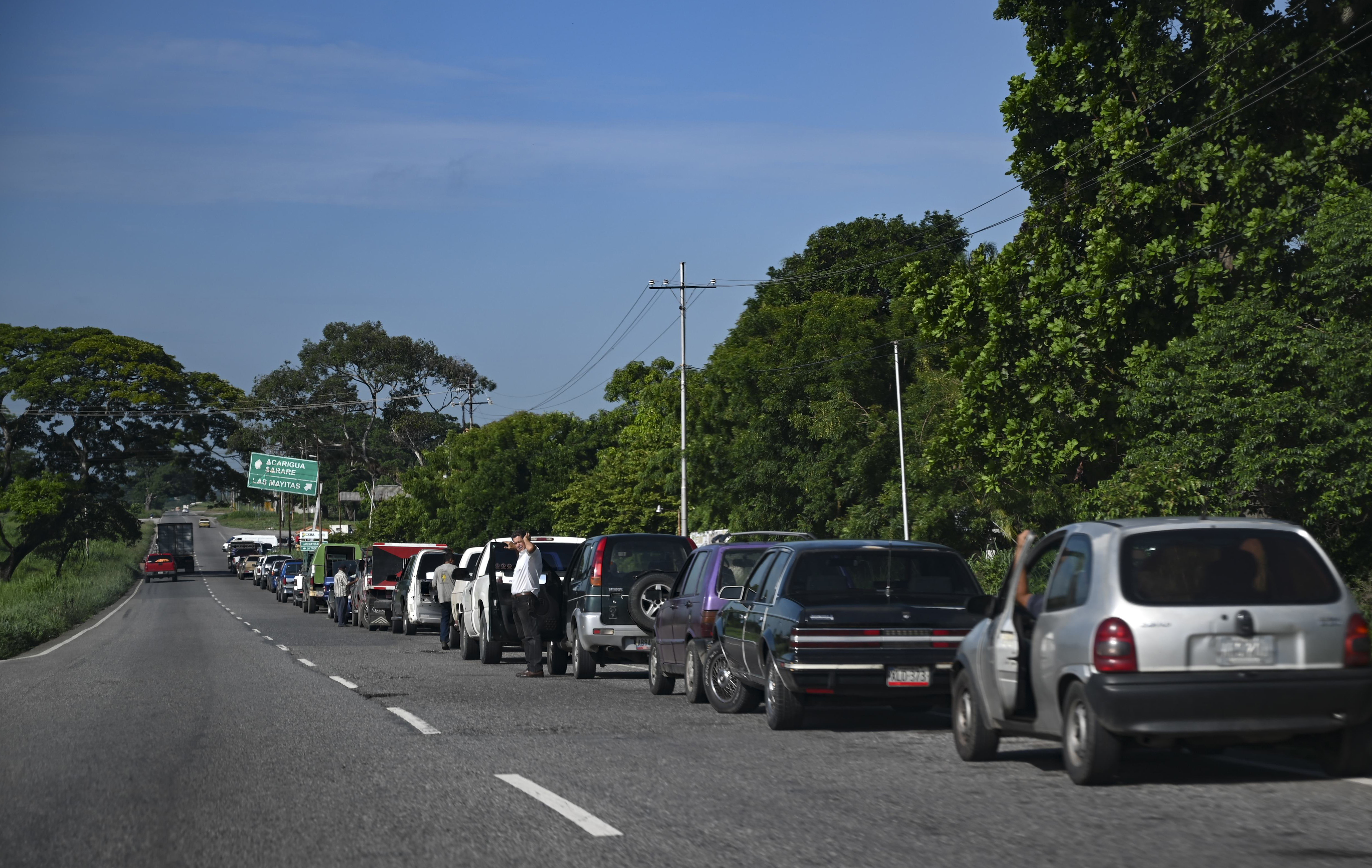
Drivers queue at a gas station along a highway in Barinas State, Venezuela, on May 31, 2019. – A rationing for the sale of gasoline was launched in several regions of Venezuela. The measures came into force in the face of shortages, chronic for years in areas bordering Colombia and aggravated in recent weeks after financial sanctions by the United States against Venezuela and its state oil company PDVSA. (Photo by Yuri CORTEZ / AFP)
BARQUISIMETO, Venezuela — Maria Lopez complains about gasoline rationing that Venezuela — home to the world’s largest oil reserves — has started introducing in some areas to tackle extreme fuel shortages.
“It’s a joke,” Lopez said.
But for ordinary Venezuelans, it is a cruel joke without a punchline — a driver recently died of a heart attack after waiting in line for days to fill his tank.
Since Monday, drivers in the western state of Lara can buy only 30 liters (eight gallons) of fuel a week, while a rationing system based on vehicles’ license plates has been introduced in Bolivar state in the south and Monagas in the west.
Fuel shortages have long been chronic in the smuggling-prone states close to the border with Colombia. But the situation worsened in recent weeks as the United States slapped more economic sanctions on Venezuela and its state-run petrol company PDVSA.
Lopez had been waiting in line to fill her tank for six hours in Lara’s capital Barquisimeto, but had to leave without getting any fuel because she had to go search for medicine for her ailing brother, who suffers from meningitis.
“It’s a joke!” she fumed again as she left the gas station empty-handed, despite the fact that between state-regulated gas prices, hyper-inflation and black-market dollar exchange rates, a dollar could technically buy almost 600 million liters of fuel.
Even though President Nicolas Maduro said last August that the rock-bottom fuel prices would go up, there has not been an increase so far.
Ivan Herrera had also run out of luck: he had been to three gas stations without managing to top up. According to industry sources, 40 percent of the 104 gas stations in Barquisimeto — a city of a million people — are shut.
“There shouldn’t be any rationing in a country like ours, an oil nation,” said Ivan Herrera. “It’s just backwardness.”
According to the Organization of Petroleum Exporting Countries (OPEC), Venezuela’s oil output has dropped from 3.2 million barrels per day a decade ago to 1.03 million barrels in April this year. Other estimates put that output as low as 768,000 barrels per day.
Sanctions imposed by Washington in an effort to force Maduro to step down have paralyzed gas deliveries from the United States, which are vital for meeting Venezuela’s domestic demand, and have also hindered the import of the thinners needed to dilute and refine Venezuela’s own heavy crude.
Confusion
In the town of Puerto Ordaz, in the state of Bolivar, Yackson Salas woke up in his car on Monday in a line at a gas station.
“I slept in the queue,” he told AFP, complaining about the confusion that surrounds the new system: drivers are supposed to fill their tanks according to their license plates, with alternating days for tags ending in odd or even numbers.
“But lots of people join the line even on days when it’s not their turn,” Salas said.
And despite the measures, the lines “stretch for kilometers,” said John Velasquez, one of 300 or so drivers waiting for his quota.
One of the waiting drivers tried to alter his license plate number with a felt-tip pen, but was spotted and thrown out of the line.
The head of PDVSA, Manuel Quevedo, said last week that the government would guarantee supplies but the shortages persisted. Maduro, for his part, blamed the shortfall on sabotage carried out against oil tankers, but offered no details.
Struggle
Even in Merida, a western state where there is no rationing yet, there are endless lines for gas.
Humberto Trejo, a 60-year-old haulage contractor, died on Monday of a heart attack after having waited in line four days for fuel, local officials said.
Local media reports said Trejo suffered a cardiac arrest after becoming infuriated that some drivers were using dollars and Colombian pesos to bribe the soldiers guarding the gas station to allow them to jump the line that had formed.
In neighboring Tachira state, residents have started smuggling in fuel across the border from Colombia, despite the crossings being officially closed, triggering long lines at pumps in the Colombian border town of Cucuta.
Until recently, the flow of smuggled fuel had gone the other way, from Venezuela into Colombia, because state-subsidized fuel was so cheap that smugglers could earn significant mark-ups in Colombia. /muf